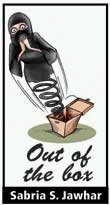Editorial from the Saudi Gazette
A Saudi not long ago was being driven by his brother along the Corniche in Jeddah while the brother had his 4-year-old son in his lap playing with the steering wheel.
The Saudi complained to his brother that the boy was not safe and should be restrained in the backseat. The driver snapped back that his brother shouldn’t be so concerned with modern Western concepts and continued to keep the boy in his lap as he sped along the roads weaving in and out of traffic.
Never mind the silly notion that the safety of our loved ones is a Western concept. Rather, it’s a human concept to protect the people we love. And if the driver was so concerned about Western influences, perhaps he shouldn’t be driving a Ford Crown Victoria.
Motorists in Saudi Arabia seemed to be blind to the fact that poor driving habits and unrestrained passengers result in serious injury or death.
The Kingdom has a seatbelt law and usually drivers and front passengers observe the law. The same can’t be said for passengers in the backseat and children. A daily scene on the Kingdom’s streets is kids flopping out of windows to wave at passing cars, playing games in the storage area of SUVs or popping out of sunroofs like a Jack-in-the-Box. Infants are cradled in mothers’ laps, making perfect projectiles through the windshield in the event of a collision or sudden stop. Saudi women, apparently our national treasure to be protected and pampered, routinely use taxis that have no seatbelts in the back seats.
It’s difficult to understand why drivers are so indifferent to safety. Few motorists in the Kingdom observe traffic laws. Red lights are ignored. Drivers turn right without stopping. Pedestrians are virtually invisible to drivers and are at peril. Motorists turn left from a far right-hand lane. Turn indicators are rarely used. Common courtesies like allowing another motorist the right-of-way is considered an assault on one’s masculinity. Travel and tourism experts often say the best way to judge a country’s airline safety record is to consider its traffic laws on the ground. If traffic laws are enforced and obeyed, a traveler can have confidence in the country’s national carrier.
Perhaps we should stop excusing our bad behavior with arguments that we are a developing country or that seatbelts and car seats for children are Western inventions and therefore evil. Maybe we should be thinking about that little guy or girl in the backseat and how we should make sure they grow up to see adulthood.
Subscribe to:
Post Comments (Atom)


No comments:
Post a Comment